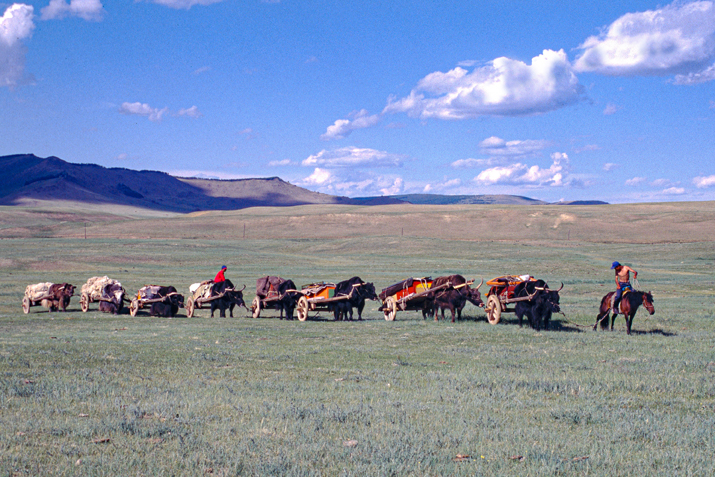
Is the rock cut a gateway to another world?
N 51°00'344'' E 100°16'848''
Day: 96
Sunrise:
08:03
Sunset:
18:02
As the crow flies:
18,78
Daily kilometers:
30,00
Total kilometers:
995
Soil condition:
Meadow, forest floor, snow, ice
Temperature – Day (maximum):
1°C
Temperature – day (minimum):
minus 4°C
Temperature – Night:
minus 13°
Latitude:
51°00’344”
Longitude:
100°16’848”
Maximum height:
1850 m above sea level
Time of departure:
12:00
Arrival time:
17:00
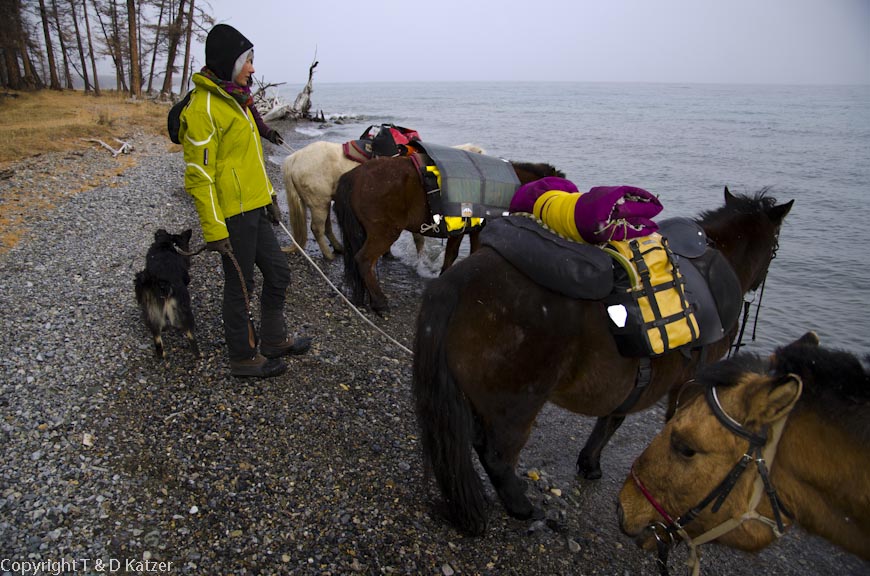
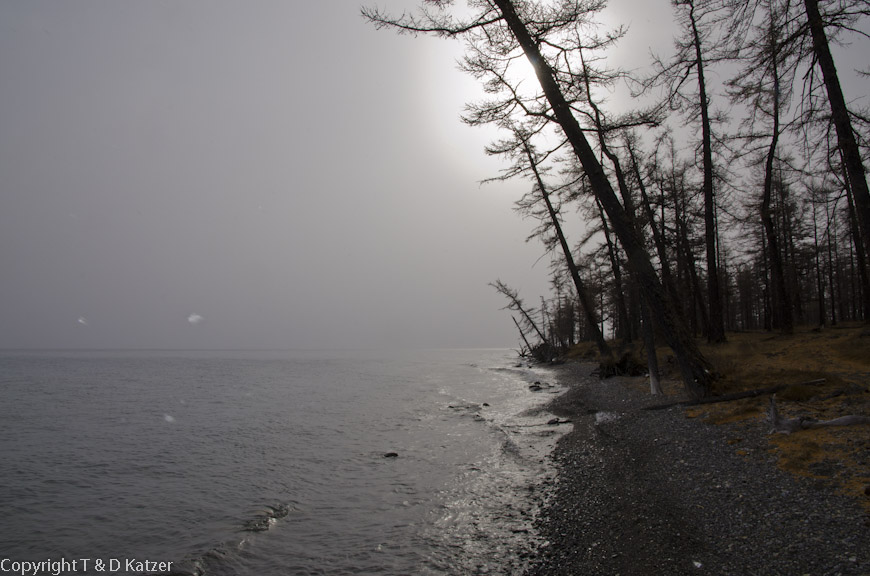

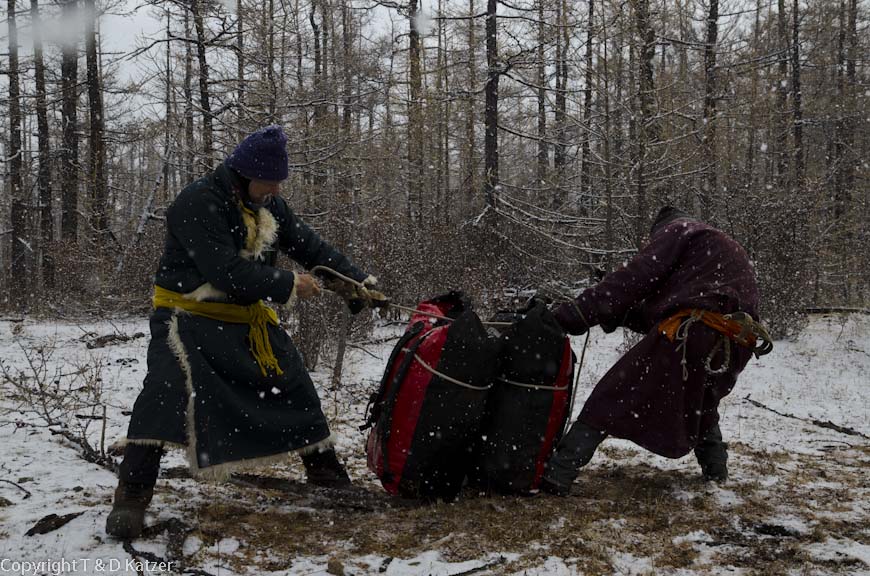
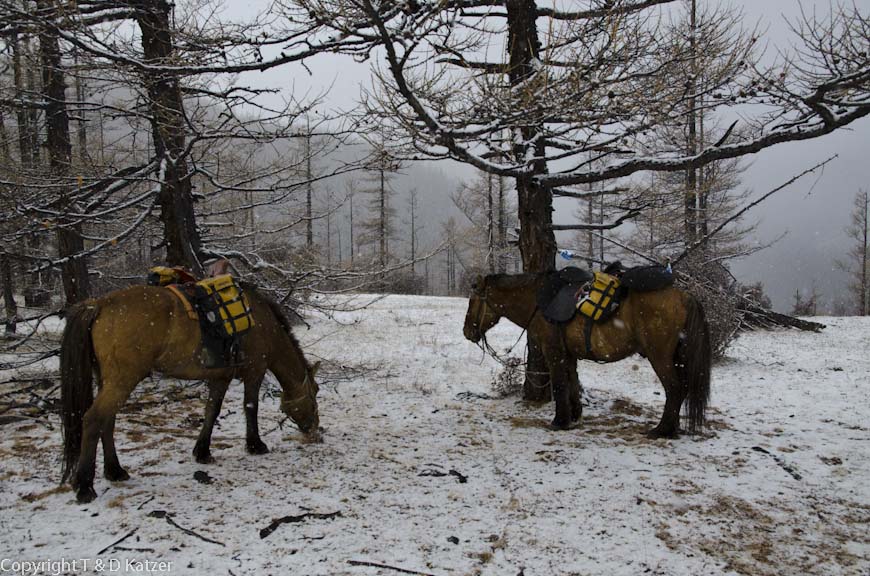
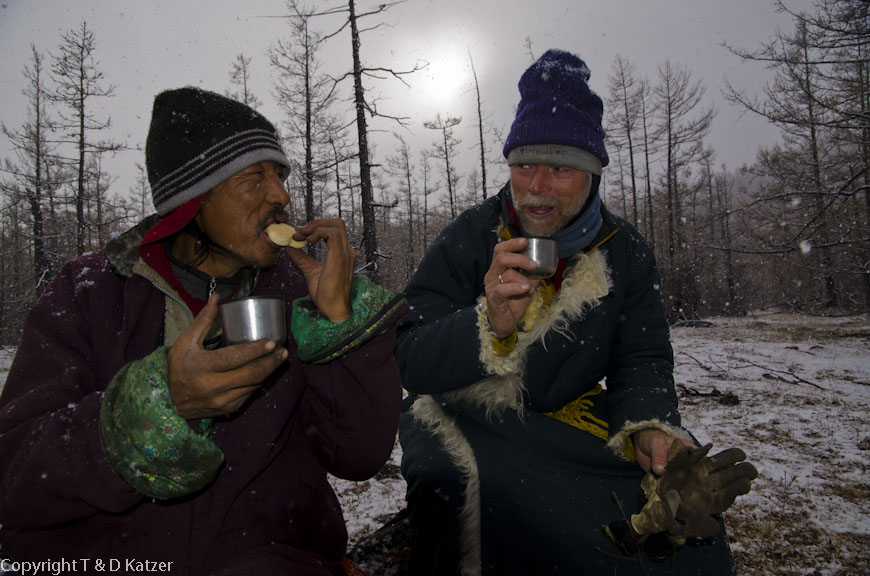
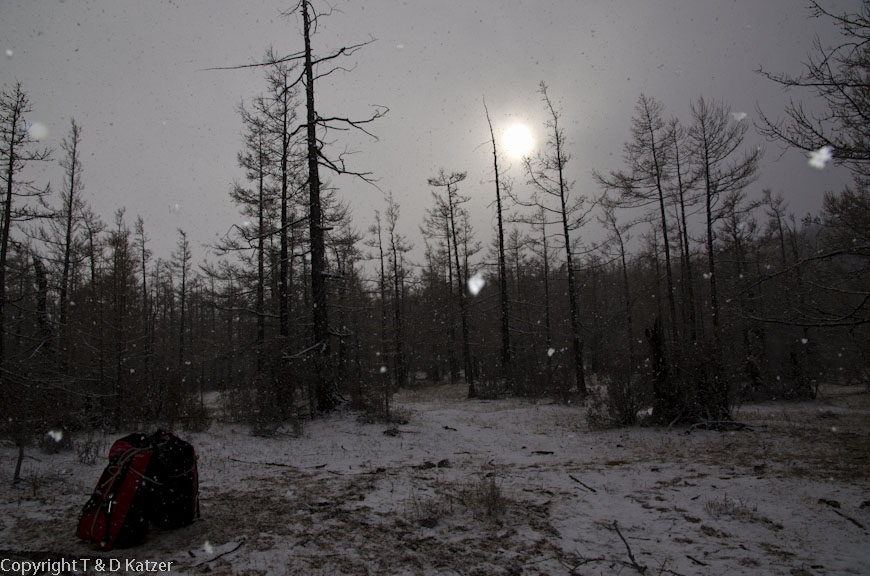
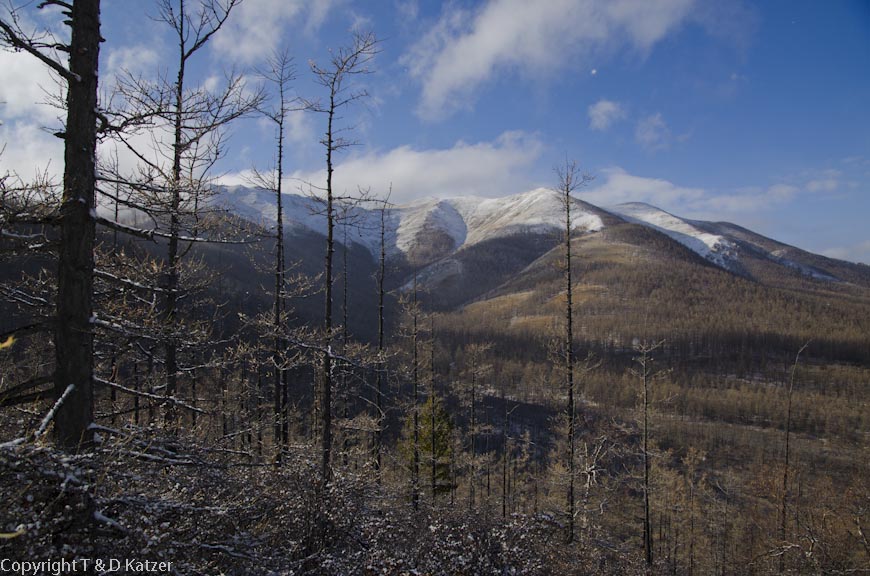
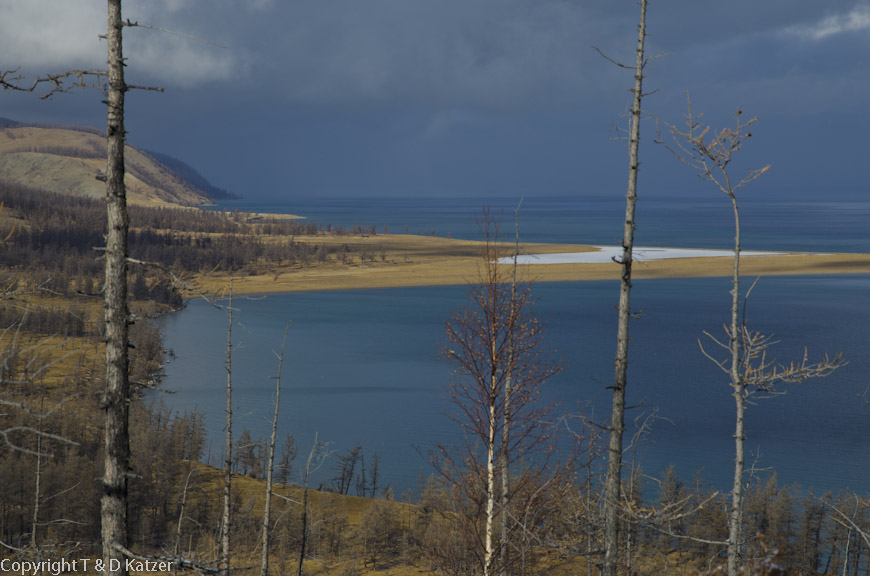

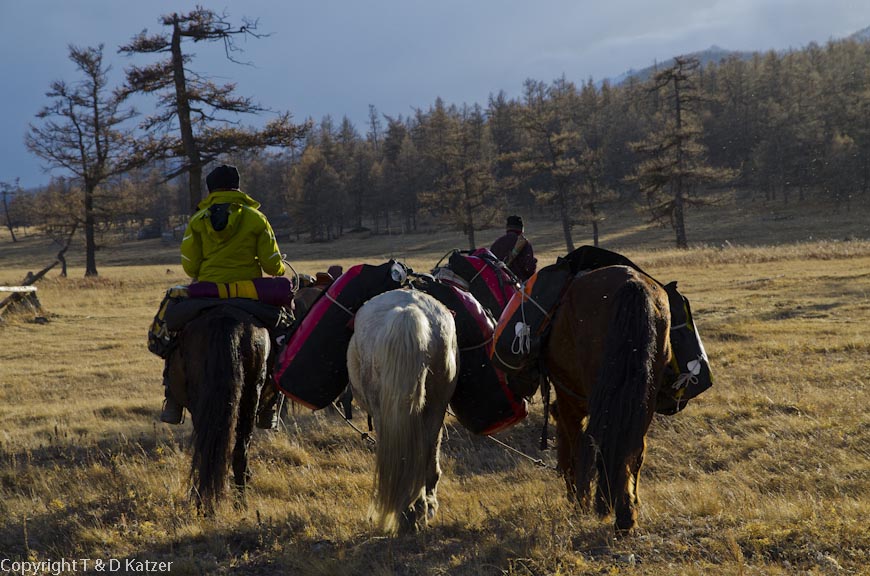
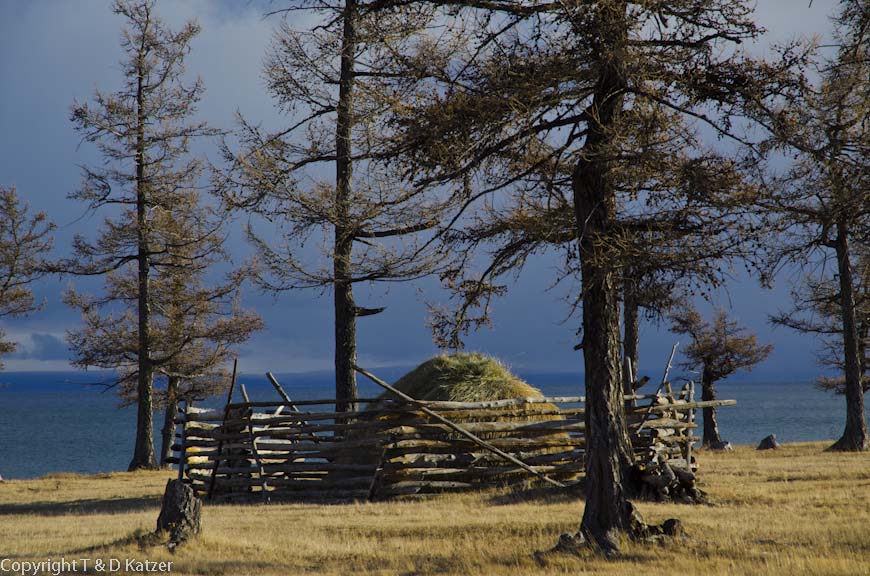


The sunshine of recent weeks has been hidden behind a gray, dense cloud cover. “It’s going to snow,” says Bilgee, looking up at the sky. “Will we still get over the passes ahead of us if it snows?” I ask him. “Tijmee. Asuudal Baighui. (Yes. No problem) But it can be difficult to find the way,” he explains.
As we ride off, it actually starts to snow. We cross a wooded area. Then we reach the lake again. Before we continue, we water our animals. The waves crash onto the rocky shore. At around minus 1 °C, we feel unpleasant and unaccustomed humidity. We quickly mount our horses and follow the edge of the Khuvsgul. It goes over frozen alluvial land, criss-crossed by countless half-frozen streams. Suddenly a river blocks our onward march. Bilgee doesn’t hesitate for long and rides his horses through the water. We follow him carefully. Mogi, who I keep on a lead again, disappears up to his belly in the cold water. But he doesn’t seem to mind much. He walks next to Sar without resisting. When we have dry land under our feet again at the other end, he shakes himself vigorously, his fur stiffening in a short time. This shows that he is indeed a dog that copes well with the cold. After just a few kilometers, a steep rock face blocks the way. We are forced to leave the lake and follow a path that leads us upwards meter by meter. “Looks like a fairytale forest,” says Tanja, pointing to the snow-covered larches. The snow is now staying put. The horses’ hooves crunch steadily up the incline. Once again we experience a landscape never seen before, covered in a white sheet. An hour later, we reach the highest point of the mountain. We agree to take a break here to drink hot tea and eat some cookies. However, the snowfall has increased. “Huaa it’s cold up here,” I shiver and get my winter shoes out of a duffel bag to put them back on. Despite the layer of ice that forms in the inner shoe, they are much warmer than our thin riding boots. Bilgee then helps me tie up the load again.
Tanja takes the thermos flask out of her saddle bag and brings a bag of cookies. Bilgee rolls up a tree trunk for us to sit on. We sit on the log in the snow and enjoy ourselves. As best the weather allows. Then the sun breaks through the wall of clouds with its power and gives us a sugar-coated dream landscape. Snow-capped mountains up to 3,000 meters high surround us. Their barren backs bear witness to the harsh climate. “Somewhere beyond that is Tsagaan Nuur,” I say, pointing west over the mountains. “Do we have to go over there?” asks Tanja with audible respect in her voice. “I hope not. According to the map, there’s a gorge whose eastern end leads to Khvsgul. Guess that will be our route through the Khoridol-Saridag mountain range. I’ll study the maps with Bilgee tonight. But as I understood him yesterday, we’re leaving the lake this afternoon and heading northwest. So he must mean this gorge.”
Half an hour later, we carefully lead our horses down the steep and slippery path. Riding is out of the question because of the snow cover. A horse could easily slip and fall. At the bottom, my GPS still shows an altitude of 1,645 meters. This is the height at which the surrounding mountain rivers have filled the large basin of Lake Khuvsgul with the clearest water in the world.
Bilgee points to an oversized gap that opens up between two mountains. “That’s our way to Tsagaan Nuur,” he suspects. “You see. Like I said earlier. There’s the gorge,” I say, turning to Tanja. Bilgee scans the mountains and the valley ahead with binoculars. He seems unsure whether we really need to go there. “I’ll ask there,” he says and rides to a log cabin that shimmers golden in the last light of the sun directly on the lakeshore. When he returns, we learn that this hut has also been abandoned. We stand there undecided, wondering whether we should venture into the gorge today. “I don’t think we’ll find any water or grass for the horses there,” Bilgee points out, which is why I decide to call it a night and camp again at Lake Khuvsgul. Bilgee and Tanja laugh. “A good decision Denis,” says Bilgee happily.
In a soft evening light that is hard to describe, we ride over golden shorelines. We pass old animal shelters and wooden huts in which the nomads stored hay for the winter. Large, gnarled larches, bent and windswept, stand majestically on the seemingly paradisiacal pasture. The last few meters to our chosen campsite seem surreal to me. They seem to me as if I were experiencing them in slow motion. The softness of the light, the black-blue of the lake, the bizarre gnarled larches bent and scarred by the wind, the neighing of our horses, the cawing cry of a crow in the treetops above us, the clouds clambering gently pink from the last light and the dark silhouette of the mountains rising behind us are simply too beautiful to be true. And yet the landscape here is real. It is a reality that makes me enjoy life. A strong, icy wind blows from the gorge across the plain. Makes us shudder. We have the feeling that it heralds another time. A time that promises a lot of extreme cold. I look towards the gorge and listen to the howling of the wind. It is similar to the howling of wolves. Somehow I have the feeling that the rock cut is the gateway to another strange world for us.
Bilgee drags a piece of tin barrel from somewhere and lights our fire in it. “Baihgui Salhi” (“No wind”), he says with a smile. “This is for your feet,” he says and gives us a piece of sheepskin to cut the soles for our winter shoes. He promises “Dulaan” (“warm”).
We look forward to your comments!

